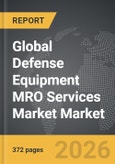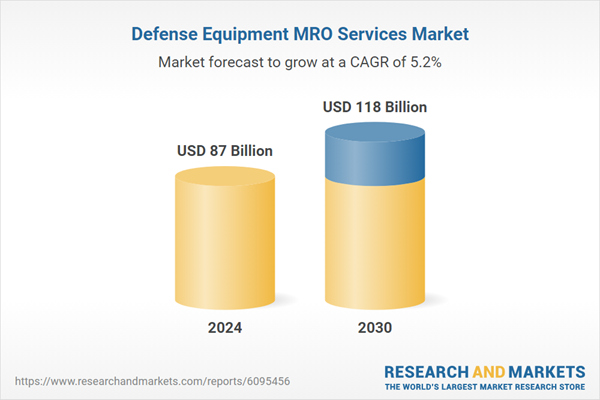Global Defense Equipment MRO Services Market - Key Trends & Drivers Summarized
Why Is Maintenance, Repair, and Overhaul (MRO) Crucial in the Defense Sector?
MRO services play a pivotal role in maintaining the combat readiness and longevity of defense platforms across land, sea, and air domains. Defense assets operate in some of the harshest environments and are subjected to immense physical and operational stress. Regular maintenance, systematic repairs, and overhaul programs ensure that these assets can perform reliably throughout their service life. As military forces around the world continue to use aging fleets alongside new-generation platforms, the need for structured and responsive MRO ecosystems has become essential.Modern defense logistics increasingly rely on performance-based contracts and long-term sustainment strategies that prioritize availability, reliability, and cost-efficiency. These MRO models not only reduce operational risks but also allow armed forces to remain agile and mission-ready, especially during extended deployments or unexpected escalations. The rising pressure on defense budgets in many countries has further amplified the importance of lifecycle management, where MRO becomes a strategic function rather than a support service.
How Are Technological Advances Transforming Defense MRO Operations?
Breakthroughs in digital technology are significantly enhancing how MRO services are delivered. Artificial intelligence and predictive analytics are making it possible to detect component wear and system failures before they occur, allowing maintenance teams to act preemptively and avoid costly downtime. The deployment of digital twins enables simulated diagnostics and repair planning, helping engineers understand wear patterns and component performance under different conditions.Integration of AR-guided repair systems and remote maintenance support is increasing technician efficiency and reducing time-on-task, even in forward-operating bases. The use of 3D printing is also revolutionizing spare parts availability, enabling the on-demand production of critical components. As defense platforms become more technologically advanced, MRO services must adapt through specialized training, cybersecurity reinforcement, and enhanced integration with enterprise defense management systems.
Which Platforms and Stakeholders Dominate the MRO Services Ecosystem?
MRO requirements span all types of defense systems, including fixed-wing aircraft, rotary-wing helicopters, submarines, destroyers, combat vehicles, and missile systems. While air and naval platforms often demand more technically intensive MRO operations, land-based systems also require frequent mechanical overhauls and system checks, particularly in rugged operational zones. Ensuring availability and mission-readiness across these diverse platforms requires collaboration among OEMs, Third-party defense firms, public-sector units, and logistics providers.Stakeholders range from government defense ministries and military maintenance corps to private-sector contractors and specialized MRO centers. Governments are increasingly pursuing collaborative models, where defense contractors are embedded within operational bases or are given long-term depot-level maintenance contracts. These models often include provisions for knowledge transfer, upskilling of local technicians, and localized supply chain development.
What Factors Are Driving Growth in the Defense Equipment MRO Services Market?
Sustained use of aging defense fleets and high operational tempos are leading to a rising need for refurbishment, life extension programs, and complex diagnostics. As defense platforms incorporate more electronics, software-defined systems, and advanced sensor arrays, the MRO function is becoming more specialized and data-driven. Defense forces are also under pressure to maintain high levels of mission readiness amid growing global instability, reinforcing the demand for fast, flexible, and reliable maintenance support.National strategies are increasingly focused on developing domestic MRO capabilities to reduce dependence on foreign suppliers, enhance sovereignty, and improve supply chain resilience. At the same time, the adoption of condition-based maintenance systems and intelligent diagnostics is helping reduce maintenance costs while improving operational transparency. These developments are shaping MRO as an indispensable pillar of modern military logistics, both for legacy platforms and emerging defense technologies.
Report Scope
The report analyzes the Defense Equipment MRO Services market, presented in terms of market value (US$). The analysis covers the key segments and geographic regions outlined below:- Segments: Type (Air-based Services, Water-based Services, Land-based Services); Service (Annual Maintenance Contract, Individual Works, Other Services); End-Use (Commercial Aviation End-Use, Business & General Aviation End-Use, Military Aviation End-Use, Other End-Uses).
- Geographic Regions/Countries: World; United States; Canada; Japan; China; Europe (France; Germany; Italy; United Kingdom; Spain; Russia; and Rest of Europe); Asia-Pacific (Australia; India; South Korea; and Rest of Asia-Pacific); Latin America (Argentina; Brazil; Mexico; and Rest of Latin America); Middle East (Iran; Israel; Saudi Arabia; United Arab Emirates; and Rest of Middle East); and Africa.
Key Insights:
- Market Growth: Understand the significant growth trajectory of the Air-based Services segment, which is expected to reach US$58.9 Billion by 2030 with a CAGR of a 4.1%. The Water-based Services segment is also set to grow at 6.7% CAGR over the analysis period.
- Regional Analysis: Gain insights into the U.S. market, valued at $23.7 Billion in 2024, and China, forecasted to grow at an impressive 8.1% CAGR to reach $23.3 Billion by 2030. Discover growth trends in other key regions, including Japan, Canada, Germany, and the Asia-Pacific.
Why You Should Buy This Report:
- Detailed Market Analysis: Access a thorough analysis of the Global Defense Equipment MRO Services Market, covering all major geographic regions and market segments.
- Competitive Insights: Get an overview of the competitive landscape, including the market presence of major players across different geographies.
- Future Trends and Drivers: Understand the key trends and drivers shaping the future of the Global Defense Equipment MRO Services Market.
- Actionable Insights: Benefit from actionable insights that can help you identify new revenue opportunities and make strategic business decisions.
Key Questions Answered:
- How is the Global Defense Equipment MRO Services Market expected to evolve by 2030?
- What are the main drivers and restraints affecting the market?
- Which market segments will grow the most over the forecast period?
- How will market shares for different regions and segments change by 2030?
- Who are the leading players in the market, and what are their prospects?
Report Features:
- Comprehensive Market Data: Independent analysis of annual sales and market forecasts in US$ Million from 2024 to 2030.
- In-Depth Regional Analysis: Detailed insights into key markets, including the U.S., China, Japan, Canada, Europe, Asia-Pacific, Latin America, Middle East, and Africa.
- Company Profiles: Coverage of players such as Aban Offshore Ltd., Aker Solutions ASA, Baker Hughes Co., Chevron Corporation, China Oilfield Services Ltd. and more.
- Complimentary Updates: Receive free report updates for one year to keep you informed of the latest market developments.
Some of the 36 companies featured in this Defense Equipment MRO Services market report include:
- AAR Corp.
- Airbus SE
- BAE Systems plc
- Boeing Defense, Space & Security
- Elbit Systems Ltd.
- General Dynamics Corporation
- GE Aerospace
- Hanwha Aerospace
- Hindustan Aeronautics Ltd. (HAL)
- Honeywell Aerospace
- Leonardo S.p.A.
- Lockheed Martin Corporation
- Lufthansa Technik AG
- MTU Aero Engines AG
- Northrop Grumman Corporation
- Raytheon Technologies Corporation
- Rheinmetall AG
- Rolls-Royce Holdings plc
- Saab AB
- Thales Group
This edition integrates the latest global trade and economic shifts into comprehensive market analysis. Key updates include:
- Tariff and Trade Impact: Insights into global tariff negotiations across 180+ countries, with analysis of supply chain turbulence, sourcing disruptions, and geographic realignment. Special focus on 2025 as a pivotal year for trade tensions, including updated perspectives on the Trump-era tariffs.
- Adjusted Forecasts and Analytics: Revised global and regional market forecasts through 2030, incorporating tariff effects, economic uncertainty, and structural changes in globalization. Includes historical analysis from 2015 to 2023.
- Strategic Market Dynamics: Evaluation of revised market prospects, regional outlooks, and key economic indicators such as population and urbanization trends.
- Innovation & Technology Trends: Latest developments in product and process innovation, emerging technologies, and key industry drivers shaping the competitive landscape.
- Competitive Intelligence: Updated global market share estimates for 2025, competitive positioning of major players (Strong/Active/Niche/Trivial), and refined focus on leading global brands and core players.
- Expert Insight & Commentary: Strategic analysis from economists, trade experts, and domain specialists to contextualize market shifts and identify emerging opportunities.
Table of Contents
Companies Mentioned (Partial List)
A selection of companies mentioned in this report includes, but is not limited to:
- AAR Corp.
- Airbus SE
- BAE Systems plc
- Boeing Defense, Space & Security
- Elbit Systems Ltd.
- General Dynamics Corporation
- GE Aerospace
- Hanwha Aerospace
- Hindustan Aeronautics Ltd. (HAL)
- Honeywell Aerospace
- Leonardo S.p.A.
- Lockheed Martin Corporation
- Lufthansa Technik AG
- MTU Aero Engines AG
- Northrop Grumman Corporation
- Raytheon Technologies Corporation
- Rheinmetall AG
- Rolls-Royce Holdings plc
- Saab AB
- Thales Group
Table Information
| Report Attribute | Details |
|---|---|
| No. of Pages | 372 |
| Published | January 2026 |
| Forecast Period | 2024 - 2030 |
| Estimated Market Value ( USD | $ 87 Billion |
| Forecasted Market Value ( USD | $ 118 Billion |
| Compound Annual Growth Rate | 5.2% |
| Regions Covered | Global |









